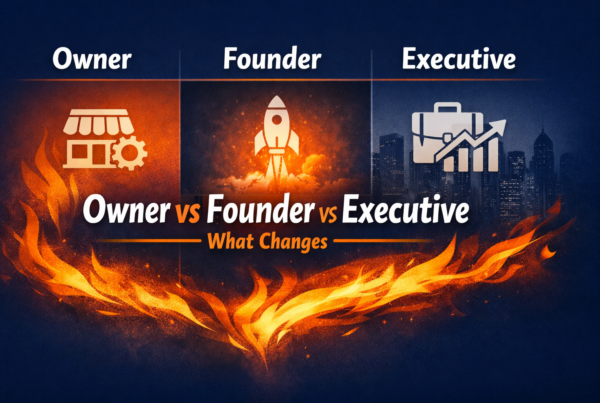Mastering Self-Doubt: Imposter Syndrome in Business Overcoming the Expertise Myth
Imposter syndrome, the nagging belief that you’re not as competent as others perceive you to be, is a silent enemy that lurks in the shadows of success. It’s a phantom whispering in your ear, telling you that you’re a fraud, that you don’t belong, that your achievements are mere luck or deception.
But what if we told you that the expertise you’re striving for, the perfection you’re chasing, is a myth? That the bar you’ve set for yourself might be unrealistically high, fueling the self-doubt you’re trying to overcome? Let’s demystify this “imposter syndrome in business: overcoming the expertise myth” and explore how it fuels imposter syndrome, especially among high-achieving women.

Key Takeaways
- The Expertise Myth perpetuates feelings of self-doubt and inadequacy in those with imposter syndrome.
- Recognizing the causes of imposter syndrome can provide a pathway to overcoming it, encouraging self-improvement and personal growth.
- Leadership is crucial in combating imposter syndrome by creating an environment that fosters growth and learning.
Transform Your Leadership Journey
Are you ready to challenge the imposter within and transform your leadership journey? Our expert coaching is tailored to help you overcome the shadows of self-doubt and the pitfalls of the Expertise Myth. Book your session now and discover how to foster an environment of growth and learning for yourself and your entire team. Let’s unlock the door to personal and professional growth together.
Dismantling the Expertise Myth in Imposter Syndrome

The “Expertise Myth” is a misleading belief that equates success with omniscient expertise in your field, implying that total knowledge of your profession is required for success. This myth is not only unrealistic, but it also fuels feelings of self-doubt and inadequacy commonly experienced by those dealing with imposter syndrome.
In reality, no one can know everything. Even the most successful individuals in their respective fields continue to learn and grow. Overcoming impostor syndrome and embracing our authentic selves becomes achievable once we debunk this myth and acknowledge that not knowing everything is acceptable.
The Expertise Myth Explained
What exactly is the Expertise Myth? It’s the belief that complete knowledge of one’s field is necessary to be competent and successful. This myth is one of the reasons why imposter syndrome exists and affects many individuals across various professions. However, it’s important to differentiate between healthy self-doubt and the debilitating self-doubt that arises from imposter syndrome.
The origins of the Expertise Myth are not definitively known. Still, it is a psychological phenomenon that promotes the idea that the most knowledgeable person is the most likely to succeed. However, it’s essential to recognize that expertise alone is not always sufficient. Combining expertise and interpersonal skills is crucial for achieving meaningful professional results.
How the Expertise Myth Fuels Imposter Syndrome
The Expertise Myth, one of the common imposter syndrome myths, intensifies imposter syndrome by setting unrealistic expectations and instilling self-doubt about one’s capabilities. Identifying and tackling these feelings is a significant step towards overcoming imposter syndrome and achieving professional success. It’s like standing at the foot of a towering mountain, thinking you should be able to scale it effortlessly because others seem to do so. But in reality, everyone struggles; they just don’t show it.
The psychological basis for the Expertise Myth lies in the belief that one’s achievements and abilities are not genuine or deserved, leading to feelings of inadequacy and self-doubt. This cognitive distortion causes individuals to attribute their success to external factors or luck rather than their competence and expertise. Regardless of their success level, many successful people themselves can experience impostor syndrome at some point in their careers.
Overcoming the Myth: Embracing Continuous Learning
To overcome the Expertise Myth, one must embrace continuous learning and acknowledge that expertise is not a fixed state but a continual process. It’s akIt’so accepting that the mountaimountain’ssn’t aisn’tular destination but an ever-ascending journey. Climbing isn’t about reaching the top but about the lessons learned, the resilience built, and the view that gets a little clearer with each step.
For instance, Rajesh Parashar, who utilizes his skills as a toolbox to solve any problem, has built his self-confidence by consistently embracing learning, taking guidance from others, and practicing positive thinking. His approach to addressing imposter syndrome is a shining example of how continuous learning can help combat the influence of the Expertise Myth.
Identifying Your Imposter Syndrome Triggers

Identifying the triggers of your imposter syndrome is a significant stride towards conquering it. Like an experienced detective, you need to identify the culprits that awaken your self-doubt. These triggers can be as innocuous as a high-stakes meeting or presentation, receiving feedback or criticism, or assuming new roles and responsibilities.
Awareness of these triggers provides a better understanding of your imposter syndrome feelings, enabling you to tackle them effectively. The key is to view these triggers not as threats but as opportunities for self-improvement and growth, turning your imposter syndrome into a catalyst for becoming a more confident and resilient professional.
High-Stakes Meetings and Presentations
High-stakes meetings and presentations often amplify self-doubt and fear, similar to how a magnifying glass intensifies the appearance of an object. The anticipation of presenting your ideas in front of a room full of peers or superiors can trigger imposter syndrome, as the pressure to perform at a high level can lead to feelings of inadequacy. It’s as if you are under a spotlight, and every misstep or stumble feels magnified.
Fear of failing to meet perceived standards or being exposed as a fraud can lead to self-doubt and feelings of inadequacy. The presence of authoritative figures or experts in the room can further exacerbate these feelings. However, acknowledging these feelings and reminding yourself of your expertise can help you navigate these situations more confidently and poise.
Feedback and Criticism
Feedback and criticism frequently lead to feelings of imposter syndrome. Imagine you’ve got a beautiful picture, but someone points out a tiny smudge in the corner. Suddenly, all you can see is that streak, and the entire painting feels like a failure. This is how feedback and criticism can trigger imposter syndrome. They can instigate self-doubt and a fear of being exposed as being like a fraud.
When someone with imposter syndrome receives feedback or criticism, they may interpret it as evidence that they are not as competent or knowledgeable as others perceive them to be. This can reinforce their belief that they do not deserve their success and heighten their feelings of being an imposter. However, learning to accept feedback as an opportunity for growth rather than a personal attack is a powerful tool in combating imposter syndrome.
New Roles and Responsibilities
Taking on new roles and responsibilities may seem like venturing into unfamiliar territory brimming with challenges. This can evoke self-doubt and the fear of being exposed as a fraud. It’s asIt’syou’re you’reg on a tightrope, trying to keep your balance while everyone watches. The pressure to perform well in the new role and meet high expectations can exacerbate these feelings, making individuals question their competence and qualifications.
Furthermore, comparing oneself to others who may appear more experienced or knowledgeable in the new role can also contribute to imposter syndrome. However, viewing these new roles and responsibilities as opportunities to learn and grow can help to mitigate these feelings, allowing you to embrace the change with confidence and resilience.
Strategies to Overcome Imposter Syndrome in Business
Having identified the triggers and manifestations of imposter syndrome, we can now examine strategies for its mitigation. Think of these strategies as your toolkit, equipped with everything you need to dismantle the fortress of self-doubt and build a stronghold of self-confidence.
From acknowledging your achievements and developing a supportive network to practicing positive self-talk, each strategy empowers you to confront and manage your imposter syndrome effectively. They serve as stepping stones to overcome imposter syndrome and embrace your authentic self.
Strategy #1: Acknowledge Your Achievements

Recognizing your achievements is akin to highlighting your strengths, especially for high-achieving women. It’s about celebrating your wins, no matter how small, and recognizing the hard work and effort that led to them. It’s about giving yourself a pat on the back and saying, “I did well.” This acknowledgment can provide the validation you need to combat the self-doubt that imposter syndrome brings.
Recognizing and celebrating your achievements can help build confidence in your abilities and remind you of your competence and expertise. It’s shifting your focus from what you perceive you lack to what you have accomplished.
Strategy #2: Develop a Supportive Network
Creating a supportive network equates to constructing a safety net. It’s about surrounding yourself with people who believe in you, who cheer you on, and who are there to catch you when you stumble. These could be mentors, peers, or friends who understand your struggles, provide encouragement, and celebrate your victories with you.
A supportive network can provide a sense of belonging and validation, which can help reduce feelings of self-doubt and isolation. Furthermore, the network can provide valuable advice and mentorship, which can help to bolster confidence and ultimately assist in overcoming imposter syndrome.
Strategy #3: Practice Positive Self-Talk
Engaging in positive self-talk is comparable to having a personal motivator within your mind. It’s about replacing negative thoughts and self-doubt with empowering statements that remind you of your capabilities. It’s abIt’ssilencing the critical voice that tells you, “You can’t,” and amplifying the encouraging voice that says, “You’ve”You’veis.”
Positive self-talk can:
- Reframe your mindset, allowing you to view challenges as opportunities rather than threats
- Elevate your mood
- Boost your confidence
- Provide the motivation you need to overcome imposter syndrome.
Remember, how you talk to yourself matters, and a positive dialogue can make a difference.
The Role of Leadership in Combating Imposter Syndrome
Leadership assumes a central role in fighting imposter syndrome within an organization. Just as a lighthouse guides ships safely to shore, effective leaders guide their teams through the murky waters of self-doubt and fear. They foster a culture of growth and learning, provide constructive feedback, and encourage openness and vulnerability.
By cultivating an atmosphere that values development and education, business leaders can help employees realize that it’s okay to know everything and that making mistakes is part of the learning process. This can help create a more inclusive and supportive work environment where employees feel valued for their unique contributions rather than judged for their perceived inadequacies.
Fostering a Culture of Growth and Learning

Cultivating a culture of growth and learning resembles nurturing a garden. It’s about creating an environment that nurtures growth, where employees can bloom and flourish. It’s about recognizing that learning is an ongoing process and that it’s ok it’s make mistakes.
By encouraging employees to set learning goals, providing opportunities for professional development, and promoting knowledge sharing and collaboration, leaders can help individuals develop new skills and competencies. This enhances their professional growth and strengthens their resilience in overcoming imposter syndrome.
Providing Constructive Feedback
Giving constructive feedback is akin to providing a roadmap. It shows employees where they are doing well and where they can improve. Constructive feedback is:
- Balanced
- Actionable
- Affirms employeemployees’ths
- Highlights areas for improvement
When delivered effectively, constructive feedback can:
- Help employees understand their strengths and areas for improvement
- Mitigate feelings of imposter syndrome
- Help employees see their blind spots
- Guide how they can improve
- Aim to build confidence rather than shatter it.
Encouraging Openness and Vulnerability
Promoting openness and vulnerability in the workplace resembles unlocking a door to comprehension. It’s creating a safe space where employees can:
- share their struggles without fear of judgment
- express their emotions and concerns
- ask for help and support
- admit when they don’t know something
- collaborate and communicate openly
Fostering a culture where it’s okay to say, “I don’t know” or “I need”help” is essential for creating a positive and supportive work environment.
Creating an environment of openness and vulnerability can help employees feel more comfortable talking about their feelings of self-doubt and inadequacy. It can foster community and support, reducing feelings of isolation commonly associated with imposter syndrome. By encouraging open communication, leaders can help their teams realize that they are not alone in their struggles and that it’s okay to ask for help.
Personal Stories of Overcoming Imposter Syndrome
Personal accounts of conquering imposter syndrome provide hope for those struggling with self-doubt. They show that it is possible to overcome imposter syndrome and that having self-doubt does not diminish one’s happiness or success. These stories are powerful reminders that you are not alone in your struggle and can overcome imposter syndrome with the right tools and mindset.
From a CEO’s journey from fear to confidence to an entrepreneur who learned to trust their instincts, these personal stories provide the world with valuable insights and inspiration. They reveal the power of resilience, self-awareness, and the determination to overcome imposter syndrome.
From Fear to Confidence: A CEO’s Journey
One such story involves the life of a CEO who transitioned from a state of fear to one of confidence. This CEO faced their imposter syndrome head-on, acknowledging the presence of self-doubt and the pressure to uphold an image of infallibility. It was a journey that required self-awareness, resilience, and perseverance.
By acknowledging the presence of imposter syndrome, adopting a growth mindset, reframing negative thoughts, and seeking support, this CEO overcame their feelings of self-doubt and impostorism. Their determination and resilience enabled them to build confidence and overcome the negative thoughts associated with imposter syndrome.
The Entrepreneur Who Learned to Trust Their Instincts

The account of an entrepreneur learning to trust their instincts underscores the relevance of accepting one’s own strengths and abilities in battling imposter syndrome. Despite the doubts and fears, this entrepreneur leaned into their instincts and trusted their judgment, recognizing that their unique perspective and approach were their strengths, not weaknesses.
By learning to trust their instincts, this entrepreneur was able to combat their own imposter syndrome and embrace their unique strengths. Their story serves as a reminder that we all have unique strengths and abilities and that embracing these can help us overcome imposter syndrome. Even students at prestigious institutions like Harvard Business School can experience and learn to overcome these feelings.
Imposter Syndrome Across Different Business Stages and Age Groups
Imposter syndrome is indiscriminate, impacting individuals at varying career stages and across diverse age and gender groups. It affects women and men alike, whether you’re a career professional grappling with new roles and responsibilities
- a mid-career professional navigating a career shift
- nearing the end of your career, reflecting on your legacy
Imposter syndrome can creep in, making you experience imposter syndrome and shaking your confidence as you face your imposter syndrome as an experienced one experiencing imposter syndrome.
Grasping the manifestation of imposter syndrome at various career stages aids in formulating effective strategies to counter it. It’s about recognizing the common triggers at each stage and equipping yourself with the tools to manage them effectively.

Early Career Challenges
Challenges in the early stages of a career may seem akin to entering a battlefield without preparation. The pressure of new roles and responsibilities, the need to prove oneself, and the fear of making mistakes all contribute to feelings of imposter syndrome.
However, it’s important to remember that everyone who lives at this stage is learning and growing. It’s okay to know everything, and it’s okay to make mistakes. What’s important is to learn from these experiences and keep moving forward.
Mid-Career Shifts
Transitioning mid-career may seem like being tossed into the deep end of a pool. The unfamiliarity of a new role or industry, the pressure to perform, and the constant comparison with more experienced peers can intensify feelings of imposter syndrome.
Recognizing these triggers and equipping oneself with strategies to manage them can help mitigate the impact of imposter syndrome. It’s about embracing the challenges that come with change and viewing them as opportunities for growth rather than threats.
Later Career Reflections
Reflections during the later stages of a career can bring imposter syndrome feelings to the surface. As one evaluates one’s cone’s achievements and legacy, one may question the worthiness of their success, triggering such feelings of imposter syndrome.
It’s important to approach these reflections with kindness and compassion. Remember that your worth is not defined by your career achievements alone but by the person you’ve been through your journey.
Summary
Imposter syndrome is a formidable adversary, with its insidious whispers of self-doubt and feelings of fraudulence. However, we can combat it by recognizing and understanding its triggers, dismantling the “Expert”se Myth,” and implementing effective strategies.
Remember, it’s okay to know everything. It’s okay to make mistakes. And it’s okay to ask for help. You are not alone in your struggle, and with the right tools and mindset, you can overcome imposter syndrome and embrace your authentic self.
Embrace Your True Potential
If the story of imposter syndrome resonates with you, it’s time to take a bold step toward mastering your self-doubt. Don’t let the Expertise Myth hold you back any longer. Book a call with our experienced business coach today, and start your journey towards recognizing and embracing your true potential. Together, we can turn your doubts into strengths and your fears into milestones.
Frequently Asked Questions
How do entrepreneurs overcome imposter syndrome?
Focus on your talents, trust in yourself and seek constructive feedback from others to help overcome imposter syndrome.
What is the expert imposter syndrome?
As an expert, the pressure to be perfect can make you feel like an impostor. You strive to please others and put in extra effort by preparing thoroughly. If this sounds familiar, you might be an expert imposter.
Do high achievers have imposter syndrome?
High achievers can often experience imposter syndrome, a phenomenon linked to anxiety and depression, despite having a lot of self-confidence and success in their careers. It is important to remember that this phenomenon is not the same as lacking self-confidence.
What is the main idea of overcoming imposter syndrome?
Acknowledging your feelings, talking to trusted people and overcoming perfectionist habits are strategies for overcoming impostor syndrome. Through this, it can help identify and challenge unfounded beliefs you have about yourself.
What is the Expertise Myth in Imposter Syndrome?
The Expertise Myth in Imposter Syndrome is the false belief or imposter phenomenon that one must be an expert in one’s field to be successful, leading to feelings of inadequacy and self-doubt.



